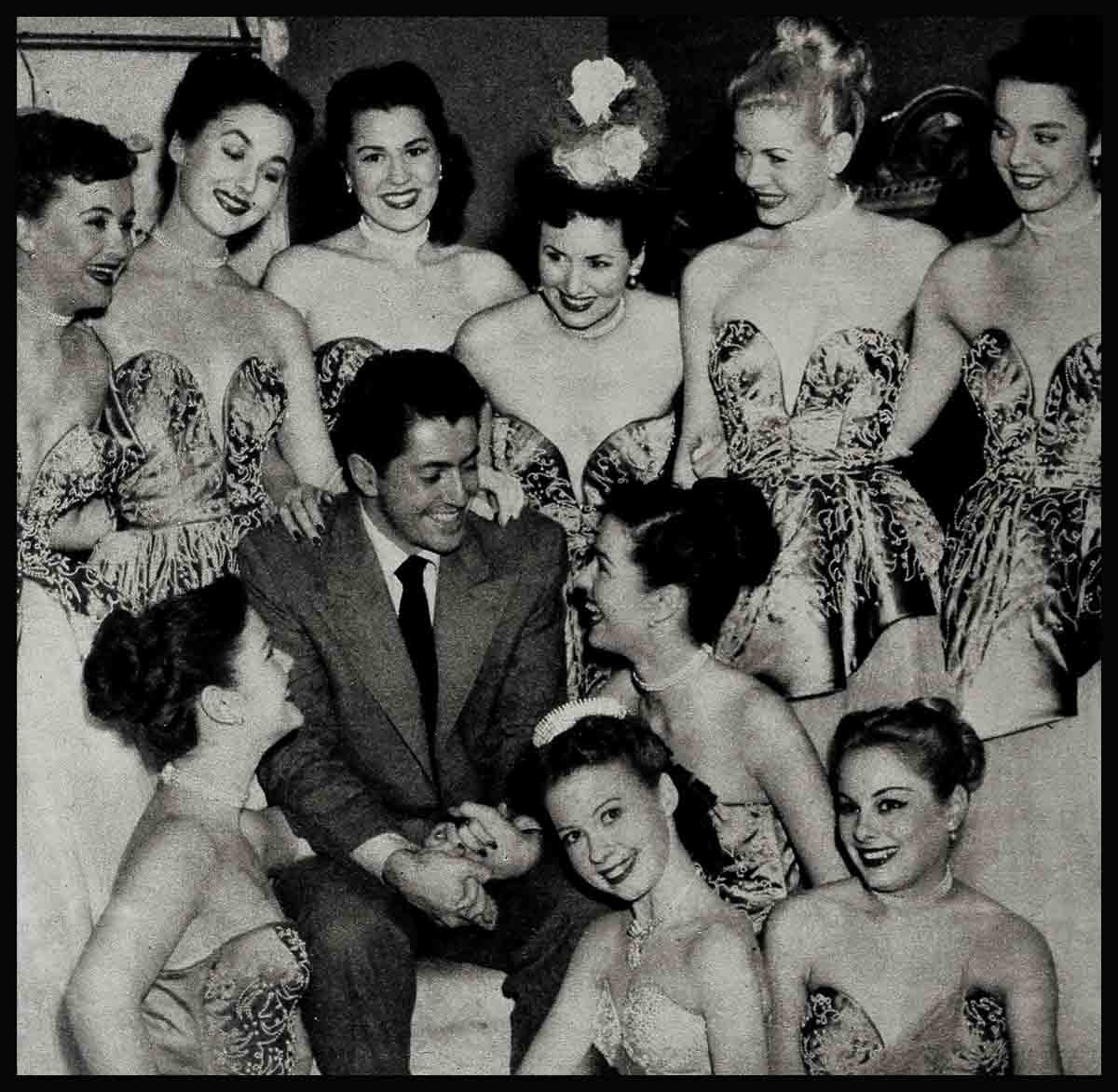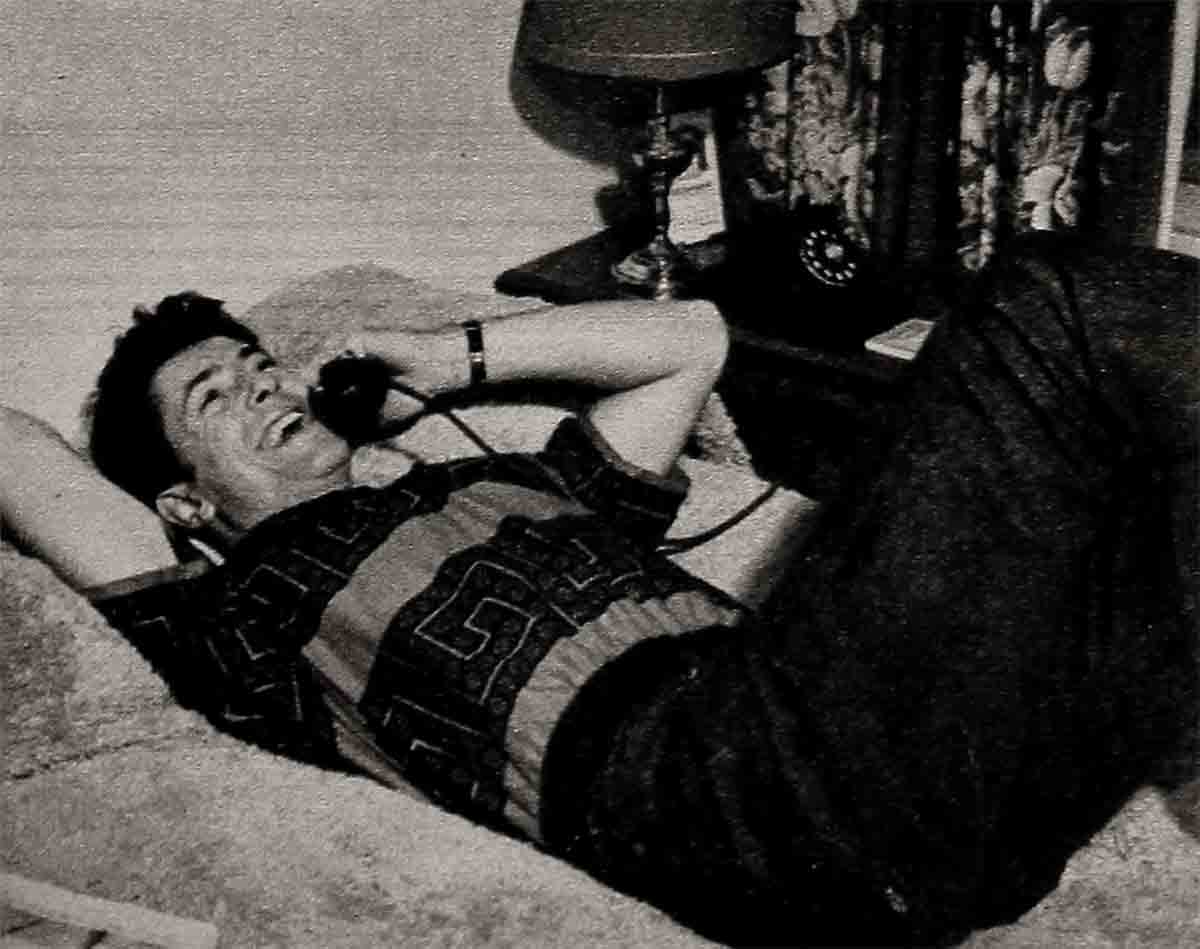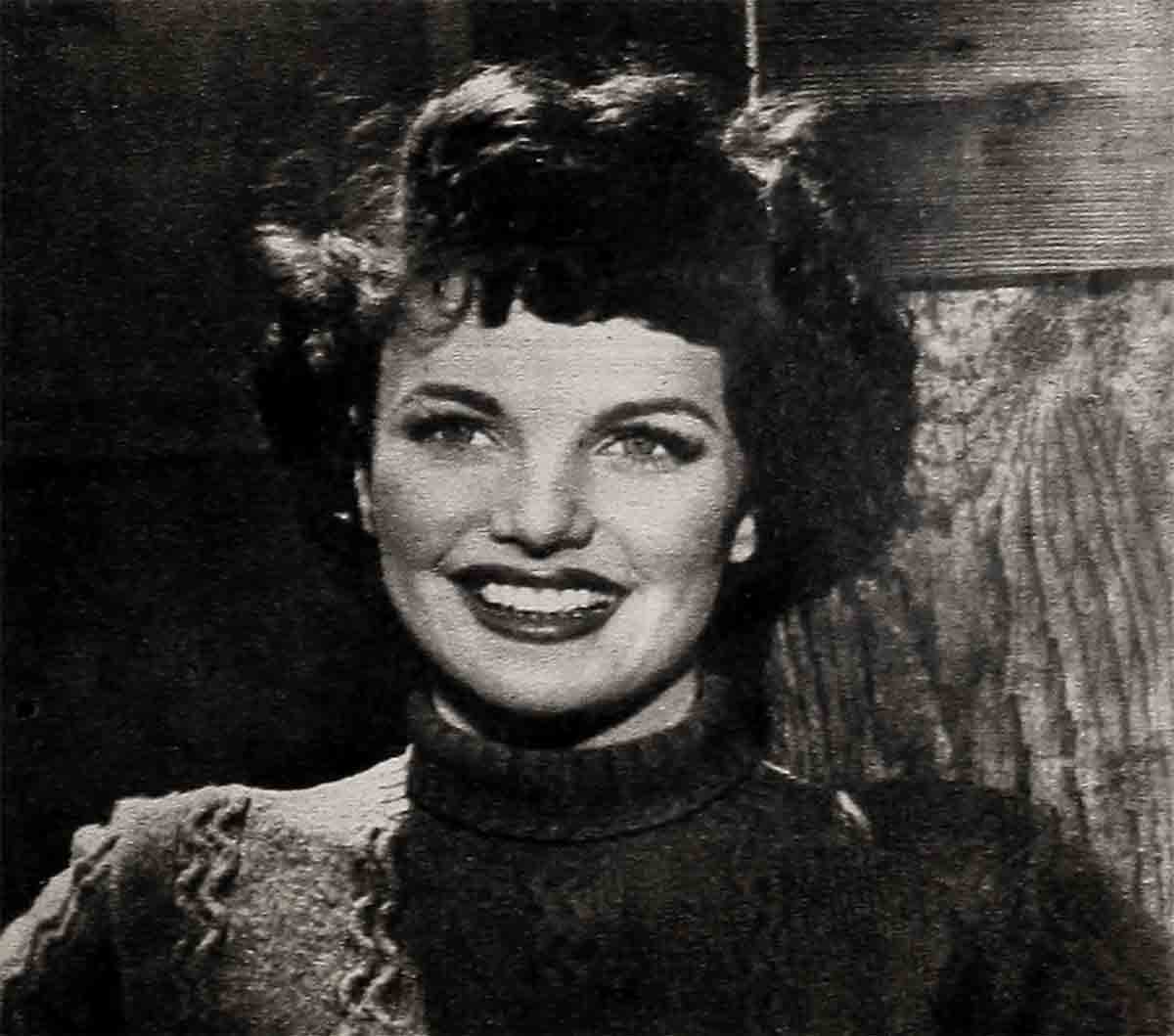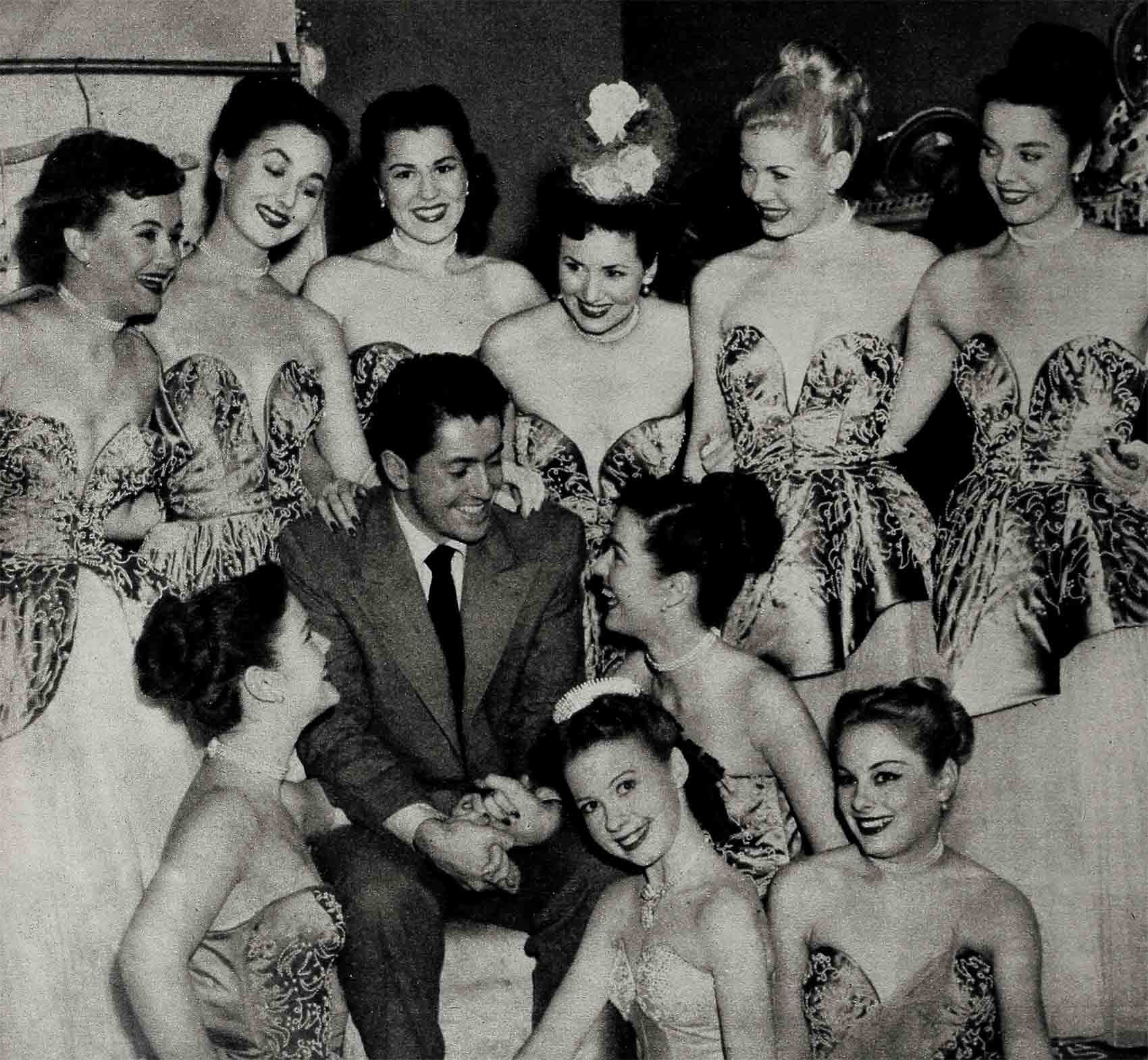
After Shelley-What?—Farley Granger
Night life in Paris sometimes extends to the Halles Centrales, a giant produce depot near the Louvre, where practically all the city’s perishable food is brought to be sorted for distribution. Workmen feverishly busy from midnight on, usually pay little attention to the revelers who wind up their play with onion soup at one of the many cafes in the district. But one dawn, a few months ago, they stopped their stooping and hauling for a sight which was too astonishing to disregard. A huge bevy of girls seemed to be skipping and running down the street into their midst.
At second sight it turned out to be very nearly the same thing as at first sight, but now they could count eight or nine girls who were somehow crammed into, above, or around a small, English two-seater runabout driven by a boy. The springs of the car were squawking louder than the horn, the girls were screaming happily and the boy was doing a masterful job despite the legs and arms interlaced all about him. A moment later he stopped the car at one of the restaurants, and after some general untangling, accompanied by merry squealing, all of them disappeared inside. The workmen smiled at each other before going back to work. This was more like it, their expressions seemed to say. This was like the gay Paris of old.
The boy would have agreed with them—even though all he knew about the gay Paris of old was what he had read. But if this was it, it sure agreed with Farley Granger. And as it was in Paris that morning. so it was in Rome. and in London. Now that he is back in Hollywood he smiles reminiscently and hopes that he’ll be having those times, with those same girls again. Farley, who loves his friends, even if as yet he’s had no loves. makes no attempt to hide what he is—a young man serious about his work, but not overly serious about life.

Two years ago when June Haver and Pat Neal kidded him about forming an “Ex-Farley Granger Girl Friends Club,” saying that Gloria de Haven and Ann Blyth, among others, would be invited to join, he good-naturedly agreed that something ought to be done to curb his activities. Now that his pal Shelley (“I am lonesome, Vittorio”) Winters has decided to stop marking time with him and turn to earnest romance with Signor Gassmann, he is wishing her all the best. And he is looking forward to an immediate future much like his immediate past, but between Farley and his bachelorhood there is already an understanding. There must be an eventual parting.
Farley has always said that he likes to travel and meet the people—girls especially. So in a sense he is looking. He admits it. “Somewhere, sometime, I should meet someone who will make me feel that I don’t want to meet anyone else,” he says. “That’s in the book for me.”
The girls he took en masse to that onion soup breakfast in Paris were members of the English chorus featured at the Club Lido on the Champs Elysees. For a bachelor the safety factor in girls is to go out with a quantity of them so that there is too much distraction to particularize. But Farley takes his risks, too. When he was in Rome with Shelley, and she was getting to know Vittorio, he was getting te know Helene, despite a formidable language barrier between them.
Helene Ramy is a fascinating French ballerina turned actress. She is a brunette, and a beauty, says Farley, “that a fellow should never write home about if his mother worries easily.” Farley didn’t write home about Helene, but he did take notes just in case.
They met at a sort of international dinner party. Farley and Shelley were the only Americans present. Helene, of course, is Paris-born. There was also an Italian actress and two Jugoslavian actors. Incidentally, they were eating in a Hungarian restaurant.
Despite the fact that-Helene’s knowledge of English is scant, and Farley’s French and Italian practically non-existent, he not only managed to make a date with her but went walking in the park with her the next day and had a three-hour conversation! How this could be is best explained by Farley himself:

“We discussed art, movies, ourselves, romance, Hollywood, bouillabaisse, dramatic technique and the stupidity of people who know only their own tongue. How did we talk? Easy—we pantomimed. If we didn’t know a word, and usually we didn’t, we acted it out. Sometimes it would take ten minutes to present one complete sentence but at the end we not only understood each other but applauded our acting!”
Unfortunately Farley’s initial success at communicating with Helene went to his head and the next day he unthinkingly called her on the telephone from his room at the Hotel Excelsior. As soon as he heard her say, “ ’Allo?” he knew he had pulled a boner. How can you perform pantomime over a telephone’?
But Farley wasn’t stumped! He rushed to the hallway outside his room and yelled for a bellboy. The one who came running turned out to be an Italian who could talk French all right—but not English! Yet he had to do. At least he could see Farley.
An hilarious three-way conversation followed which someday may even become part of a Granger movie. Farley acted out his words for the bellboy who spoke a them to Helene. Her answers were acted out by the bellboy for Farley while Helene waited. But it worked and at the conclusion Farley and the boy congratulated each other for wonderful performances.
The call was about another date, of course. At the appointed time and place Farley was there, and within a reasonable time, Helene showed up. With one skillful wave of her hand she managed to signal, “Hello! How are you? I am sorry I am late” . . . and the acting started all over again.
When Farley says he wants to see the girls he met on his last trip, most of his friends think he has Helene in mind. But he could mean others. He could mean Peggy Malie, who worked with him in I Want You in Hollywood, or Melissa Hayden, who dances with New York’s City Center Ballet and was playing an English engagement in London when he was there, or maybe even Betty, Madge or Caron who dance at the Lido. And there is still another for whom his admiration is unbounded—Geraldine Brooks who deserted the movies for TV in New York. Farley was no sooner back in Hollywood than he announced plans to spend Christmas in New York, seeing as much of Geraldine as he could.

The time he spent with other girls in Europe was not time he denied Shelley, who joined him there, and whom he had promised to escort around. She was ill a good deal of the time.
In London, Farley was supposed to escort Shelley to the British Festival but didn’t—again she was struck down by the same malady. At this point Peggy Malie unexpectedly walked in. She had been in Paris and had suddenly decided to cross the Channel. She didn’t even take time to change the plaid coat and slacks she had on when the notion struck her.
Shelley immediately suggested that Peggy accompany Farley to the expedition. But while there was to be no formality about the visit you still don’t make personal appearances in London in slacks. Peggy simply rolled hers up above her knees so they were hidden by the coat and she and Farley were off. An hour later she again showed her resourcefulness when someone at the festival got the signals crossed and introduced the pair to the crowd as “Shelley Winters and Farley Granger.”
Farley was for straightening out the mistake but Peggy pulled him back beside her. “Forget it,” she whispered. “Don’t make a fuss.” And very sweetly she stood up and bowed her head (which is blonde) left and right. It went over fine and when they got back to Shelley they were able to tell her that she made a swell impression that night.
In every fellow’s life there is at least one girl who gets him to thinking that she would make a very practical partner. In Farley’s life that girl happens to be Melissa Hayden. Melissa likes to have fun but she also keeps a sharp eye on what’s happening around her at all times. When she is with a mixed group of couples dining out, for instance, and the waiter brings the bill in one whopper of a check, everyone automatically waits for Melissa to do the accounting. She can mentally “tote” up just what each escort owes, in a flash, and be so exact that nobody would dream of arguing with her . . . not even the waiter if she happens to catch him in a bit of excessive addition.
Farley thinks that one of the outstanding I personalities he met in England was Dame Sybil Thorndike, who is in her eighties and was starring in Waters Of The Moon, a legitimate play which he went to see in London. Afterwards he literally sat at her feet as they talked about the theater.
“I am so glad you young people have come to see us,” she said. “You are so fresh and animated in your ways.”
But as she was talking Farley felt that she herself was showing more vitality and energy than even Shelley could. He told this to Shelley later and she promptly snapped, “But I’ve been sick!”
Farley’s parting words to Dame Sybil Thorndike were: “I’ll never know what you know about acting by the time I am your age.”
“My dear boy,” she replied, “by the time you’re my age you can have learned everything.”
When he told that to Shelley she said, “And you’ll need every year of it!”
This is the bantering kind of relationship he’s had with Shelley that he’s going to miss. And Farley knows it. “I think it is easy enough to be attracted to someone, even to fall in love,” he has said. “But it is not so easy to make a real friendship.
“You know,” he added, in a lighter vein, “some fellows once told me, you are pretty mixed up when you think that the more girls you know the more you’ll know about girls.
“Well, it’s confusion. I wouldn’t want to give it up just for the satisfaction of knowing that I am a clear-headed young man. A fellow can get awtully tae picking up technical honors like that.”
Actually he is serious about meeting the one girl of his life. He thinks that she will more likely be of the theater than the screen although this is not an absolute requirement. He knows better than to set up qualifications on this sort of matter.
“It’s just that the theater seems to absorb a person less completely and permits more time for general living,” he says. “In movies each picture that you make takes all your time, a whole hunk of your life, until it is finished.”
Yet Farley, when he got back to Hollywood, didn’t take an apartment again but a house. And soon afterwards he entertained . . . a group of married couples. He seemed to be studying them and you might imagine that he was trying to visualize himself in the role of a husband. What conclusions he came to nobody knows, but something happened which was rather unfortunate since he is contemplating taking the ultimate plunge.
First he showed everyone around in a group and there were the usual comments. Later he would find himself alone with just one of the husbands or one of the wives. Invariably, he reports, their words were rather wistful. What one fellow said rather sums up what they all said:
“It’s a nice place and it’s pretty wonderful to have it all alone and do what you want to do. And imagine . . . being able to pick up any time and go where you want to and do what you like.”
This set Farley thinking but he is old enough to figure out that it is normal for wedded folk,to look back nostalgically to what they recall as lost liberties of single blessedness. So he doesn’t think this will scare him any. It might delay him a bit though.
“But that’s all right,” he says. “I wasn’t in a hurry anyway.”
THE END
BY VİCKI BLODGETT
It is a quote. MODERN SCREEN MAGAZINE MARCH 1952




